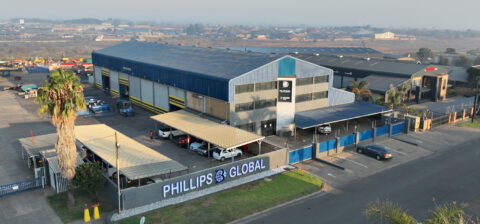Freight, Logistics and Warehousing
Prepare For Take-Off
“South Africa’s coastline stretches from east to west with ports on both coasts, giving us an incredible competitive advantage on trade lanes,” says Linsen Nambi’s managing director, Durand Naidoo. “But, with virtually no ships registered in South Africa, all of our cargo moves on foreign ships.”
Linsen Nambi is South Africa’s first 100 per cent black-owned shipping company. And, the business is helping to grow the country’s merchant fleet register — which famously was empty until 2015.
“South African companies have to pay these foreign shipowners in US dollars, which reduces our balance of payments as well — a double-negative for the country,” says Naidoo.
Estimations are that more effective control of South Africa’s oceans could add R177-billion to the country’s GDP, making it an area worth government’s attention — and it’s being noticed, as evidenced by the gazetting of the Comprehensive Maritime Transport Policy (CMTP) in June 2017.
The CMTP’s strategic objective is to develop modalities for the creation of a national shipping carrier to serve South Africa’s economic and trade interests, which Naidoo says is a fantastic aim, but requires participation by the private sector to unlock true value.
“Our dream was realised when several private players came together to transform the industry, and there’s no reason more partnerships like that shouldn’t be put in place,” says Naidoo.
“The maritime industry has been successful in creating employment in other emerging markets and has the potential to create a new industry, with new jobs, in South Africa.”
Big Development Plans
Linsen Nambi Bunker Services currently provides bunkering services within the ports of Durban and Cape Town with three of their own vessels. And, there are plans already in motion to launch Linsen Nambi Liquid Bulk, which aims to deploy vessels along the coast by 2020.
“We expect more imports of low sulphur fuel oil, in compliance with the IMO2020 regulations, and we have a competitive advantage as 100 per cent black shipowners who currently crew and technically manage our vessels in-house,” says Naidoo. Linsen Nambi currently employs more than 100 South Africans at sea, a number it plans to double in the next two years. The company has also tendered to the Department of Transport on an RFQ to participate in a public-private partnership to design, build, finance, operate and maintain two emergency towing vessels that will assist vessels in distress and prevent pollution at sea.
“This contract has previously been held by the same company for the last 40 years and we believe it’s time for a change,” says Naidoo.
Naidoo says that the shipping industry is not for the fainthearted due to its cyclical nature, but he advises that researching the ebbs and flows in the maritime landscape will enable new players to form a target, then strike hard.
“The key to the success of the South African shipping industry is the registration of more vessels in our country. This would keep all the fees and taxes currently going elsewhere within the industry and boost the country’s balance of payments and current account,” says Naidoo. “The future of the industry lies in local participation in the burgeoning gas industry — something South African companies are not doing effectively, yet. If we don’t capitalise, we’ll effectively be handing control of yet another sector to foreign players”.






 Sign-up and receive the Business Media MAGS newsletter OR SA Mining newsletter straight to your inbox.
Sign-up and receive the Business Media MAGS newsletter OR SA Mining newsletter straight to your inbox.